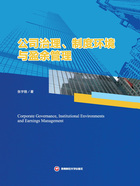
1.3 Objectives of the study
After reviewing a large body of literature, we find that most of the previous studies commonly implement cross-sectional analyses regarding the relation between firm characteristics and earnings management, which are inevitably subject to endogeneity problems. Previous studies stress that corporate governance structures are a significant determinant of earnings management. To the best of my knowledge, however,there are not many papers discussing whether corporate governance structures affect earnings management as much as institutional factors like accounting standards. Recent studies also suggest that legal protection improves earnings quality. However, we argue that those cross-country studies are generally subject to the following important drawbacks:(a)a relation between legal protection and earnings management potentially arises from country-level, non-legal characteristics(e.g., culture or religion),which are correlated to country-level legal factors;(b)previous studies commonly use an aged legal protection index, which has recently received criticism due to a coding problem. This study principally intends to present empirical analyses of the issue to address the aforementioned concerns.
Specifically, we firstly compare the impacts of insiders′ incentives on earnings management to those of accounting standards by using Chinese data. Chinese companies have recently experienced two noticeable institutional reforms: the Splitshare Structure Reform(hereafter denoted by SSSR)and the mandatory adoption of IFRS-convergent New Accounting Standards(hereafter denoted by NAS). In 2005, the China Securities Regulatory Commission(CSRC)initiated the SSSR to require firms to convert non-tradable shares(NTS)to tradable shares(TS). Given previous research findings(e.g., Firth et al.,2007), the substantial reduction in NTS should considerably decrease insiders′ incentives of expropriation and earnings management. The Chinese Ministry of Finance also obliged listed companies to introduce IFRS-convergent NAS in 2007, which considerably affects the opportunities of earnings management. These events that are likely to substantially change insiders′ incentives and accounting standards provide appropriate material with which to investigate:(a)whether corporate governance structures affect earnings management as much as accounting standards;(b)whether the change in corporate governance structures surrounding the important institutional change(the SSSR)is related to the change in earnings management. The latter analysis is advantageous in mitigating endogeneity problems that annoy previous studies.
Secondly, this study investigates whether legal protection affects earnings management in the single-country setting(China). Single-country data have relatively small variations in culture and other aspects that are advantageous in avoiding non-legal factors contaminating the relation between legal protection and earnings management. A related earlier work(Fan et al.,2013)that adopts China as its focus implements cross-sectional regression analyses that are subject to endogeneity problems and biases due to institutional changes. Given that Chinese provinces have experienced improvement in legal environments over time(MacNeil,2002),and Fan and Wang(2011)provide a Chinese legal index that has time-variant properties, I adopt firm fixed-effects model estimations of abnormal accruals that take a value for every single year to address these concerns.
Nevertheless,single-country analysis addressing the effect of legal protection on earnings management has deficits in terms of the generalizability of the results. The results of single-country analysis could be attributable to some specific research settings(e.g.,existence of NTS in China). In addition, the Chinese legal protection index does not include a direct measure of investor protection, which has received particular attention from researchers. As a result, this study also examines the effects of investor protection and individual corporate governance structures on earnings management in an international setting. Given that the original anti-director rights index has been recently subject to criticism regarding its unreliable coding,this study employs the latest investor protection indices available in Spamann(2010)and Djankov et al.(2008)to address the issue. We also consider several important corporate governance factors(such as foreign ownership or characteristics of board), which are not addressed in existing literature.